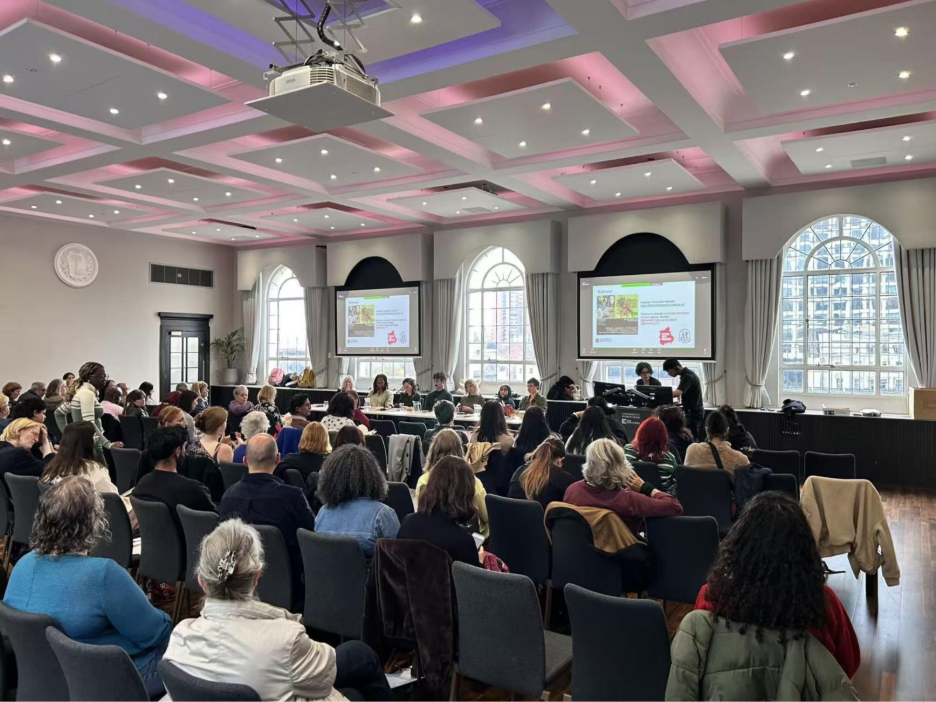The impressive turnout for an event on feminist approaches to literary translation indicates a significant interest from the public.
My translation of the above picture: people want to know about feminist literary translation. I arrived ten minutes before the start of 11 October’s “Book Launch: Feminist Literary Translation” at the Birmingham Literature Festival 2025, and I will be honest: I looked at the size of the empty room and wondered if the number of chairs lined up was perhaps ambitious. And yet, twenty minutes later, as latecomers came to the door and scanned the room for the few remaining empty seats, the feminist translator within me rejoiced. An event about feminism and literary translation is clearly something that the wider literary public – in Birmingham at least – wants to know more about.
Put into practice: A new volume of feminist translations
Translations done for the event, which were published in An Anthology of New Feminist Translations and distributed to attendees, demonstrated the extent to which the wide range of texts, from authors of different genders, were ripe for a feminist translation. Each of the translators had a slightly different approach to the feminist nature of their translation: from the vulnerability of uncertainty in Anam Zafar’s translation of Najat Abed Alsamad’s “My fleeting return to Syria: First impressions of Sweida”; to the urgent necessity of a collaborative and feminist approach to the translation of children’s and young adult literature, as illustrated with Ruth Donnelly’s translation of Andrea Ferrari’s “The Picture of Verónica G”; to the benefit of discussions between two perspectives, from two different translators, as Seán McDonagh and Georgia Wall emphasized on their reflection of their translation of Clelia Marchi’s “Not a Word of Lie: The Story of One Woman’s Life, Written on a Bedsheet”; to the creative, and adeptly done, adaptation/translation of Ihsan Abdel Kuddous’s short story “She Tried, Failed, and Tried Again” into a playtext by Elete Fearon-Nelson; to Marilyn Booth’s translation across both language and time in “Good Consequences; or, The Winsome Maiden of al-Zahira” by Zaynab Fawwaz. All of these translations, as well as illustrations and translator’s notes, were given to audience members in a brilliantly colored volume published by the Emma Press on behalf of the Feminist Translation Network at University of Birmingham.
The twin luxuries of funding and time
One thread that ran through each of the translator’s discussions was the luxury of time: time for thinking, discussing, researching, pondering, and more. This luxury was afforded them by the parameters of the project, as they were paid to do this translation, with the only request that they chose a text which they thought would benefit from a ‘feminist’ translation. Because there was no pressure to pitch their translation, nor was there pressure to adhere to the demands of a publisher, the translators were able to relax into their translation, to try different things, to talk to others, and overall, to come up with feminist solutions to the challenges posed by each of their particular texts.
For several of the translators, this meant thinking about the audience of their translation. Nelson-Fearon, for instance, was able to take the time to research feminist translation, which led to consideration of a text wherein the characters do not have a large representation in the canon of the target language. McDonagh and Wall, meanwhile, emphasized the amount of discussion they were able to have. Through this discussion-heavy, collaborative approach, they were able to balance a raw, literary authenticity, while also making it into a text that might be enjoyed by a wide target audience.
This project was funded by an AHRC IAA grant and the funding was certainly well spent. The translations that resulted were thoughtful, disruptive, creative, and caring, as were the readings and reflection done by the translators, and chair Rosalind Harvey, at the event. The wealth of questions from the sizable audience indicated a desire for more: more feminist translation, more elucidation of what feminist translation entails, and more events like this to gather and discuss. Many thanks to Hilary Brown, Principal Investigator of the Feminist Translation Network, for organizing, and to the translators for their inspired work and reflection – I cannot wait for the next event!
Audrey Kelly
Queen’s University, Belfast
